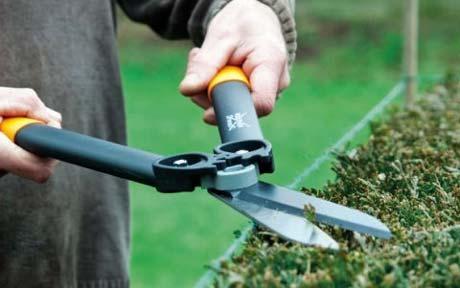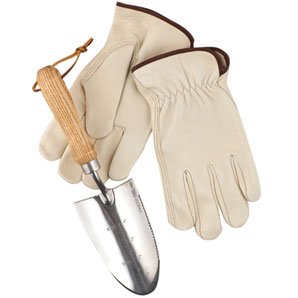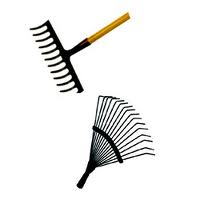When you start planting your first garden you will probably only want to use your bare hands to do the work. It won’t take long at all for you to realize how helpful gardening tools will be. You might be tempted to go out and buy every gardening tool at your local plant store. Try to quell these urges! You might wind up owning a bunch of stuff that you don’t really need! Start simply with what you need right now, like watering hoses by Gilmour, and then, over time, add more tools as they become useful to you. You might learn that you only have use for a few every day tools and don’t actually need the fancier and more expensive tools that are available.
Here are a few gardening tools that you can use to start your tool collection:
Garden Gloves
Every gardener needs a good and sturdy pair of gardening gloves. Gardening gloves help protect your hands as you work in the dirt and with the plants. Most gardeners like working the earth with their bare hands but sometimes gloves are necessary for protection. For example, when you are pruning rosebushes or other plants with thorns, you will want to wear gloves to protect yourself against scratches and being stuck.
Gloves also provide protection for your hands when you work with substances that will leave residue behind like fertilizer and compost. Wearing gloves also protects you against the various creatures (like bugs) that might inhabit your garden.
Garden spade
The garden spade is a very useful tool especially when you are growing smaller plants in your garden. You can easily uproot weeds with a garden spade. You can also use them to help clear debris and dirt away from your garden plants without your having to worry about accidentally damaging the plant’s base. You can also use them to help you plant seeds. It isn’t likely that you will use the garden spade every day but it is good to have on hand for those times when you want to do delicate work around your plants. Your spade will save you lots of time and effort with a bunch of different gardening tasks and projects.
Garden Hoes
You will need hoes for your garden. Many people think that using a garden hoe is a big pain. Most new gardeners think that using a hoe is optional and something they can avoid. If you have a large garden, however, you will need to hoe your garden on a regular basis. Hoes are useful because they help the gardener create neat rows for planting. Making garden rows is much easier to do from a standing position than a kneeling one. Hoes are very useful for outlining planting rows and keeping them separated from each other. For this reason you will want to get a long handled hoe.
You might not believe this but using your hoe will save you more time than you can imagine while you are building your garden.
Garden Hovels
Hovels are very important tools for gardeners. A hovel can either have a short handle or a long handle. Typically a hovel is a shovel that has a rounded point. A short handled hovel will help your balance while a long handled hovel does not do this. The primary purpose of the hovel is to dig holes. When you want to transport a plant, dig it up using your hovel: the rounded tip keeps it from getting tangled in root systems or accidentally damaging the root bulb of the plant. They can also be used to pat down the earth as you relocate your seedlings or plant your seeds.
Gardening shears and gardening pruners
Gardening shears as well as gardening pruners are something that just about every gardener, regardless of experience level, will need. Like with other gardening tools, pruners and shears can come in a bunch of different sizes. If your plants are showing signs of death or damage you can use the shears and pruners to get rid of the parts showing the worst of these conditions. Doing this type of cutting can help keep your plants healthy. For gardeners who plan to grow extensive flower patches, keeping clippers and pruners handy will be helpful when they want to create clippings. Clippings are how many gardeners start new plants. You can decorate your house with the flower cuttings and clippings if they are taken after the flowers have bloomed.
Garden Pitchforks
Pitchforks can be an incredibly useful tool for gardeners-even gardeners who are planting small gardens. The work a pitchfork does can also be done by a trowel or a spade but the pitchfork does it on a much larger scale. They are awesome for aerating your garden soil, moving around your compost and turning the earth in your garden. As compost breaks down it will need to be turned-this is something that only a pitchfork can do easily and quickly. Compost that doesn’t get turned simply forms a big hard shell that cannot be used for anything.
Garden Rakes
You should definitely have a big rake. Your garden rake will work well in small garden patches. For bigger plots of land, however, a rake is a great gardening tool to have on hand. Rakes are used for a lot more than the simple gathering of leaves. Use your big rake to help smooth the soil and increase the oxygen flow to the places you want to plant your seeds. The flat side of your rake can be used to smooth down the dirt on the topside of your garden plot. A rake for leaves is usually plastic. Garden rakes-even full sized rakes-are usually made of metal (usually steel).
Things to remember when purchasing garden tools: steel blades will last longest. Handle choice is a matter of personal preference. Soft rubber handles are easier on the grip. There are also ergonomic designs that take the stress off of your wrist. A narrow blade is good for digging in solid soil. Wide, rounded blades remove soil faster. Also, you will probably wind up with a couple of different sized trowels in your tool shed.
Gardening can be an incredibly rewarding hobby as well as a fantastic profession. The more you learn about gardening the more you will want to purchase the tools being sold at your local plant store or gardening department. Instead of spending too much money on tools you may never use begin with the basics. The more time you spend working with your plants the more you will start to learn the difference between the tools you use and the tools you wish you needed to use.







